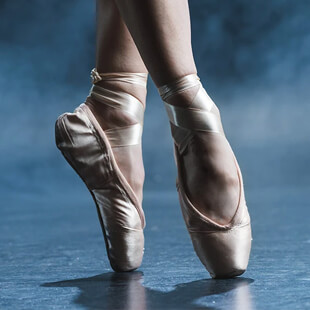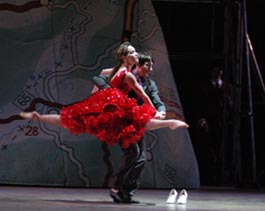Shay Kuebler’s short, compact body tends to move with concentration and purpose. Maybe it’s his karate training from age five that taught him such serious physical intention. Yet Kuebler likes to have fun, in conversation and also on stage, where his embellishments – his dancer’s bag of tricks – continually break the solemn trajectory. The exuberance of his flips and rolls is catching.
Both seriousness and fun define Karoshi [death by overwork], Kuebler’s first full-length choreography. The piece is inspired by the disturbing subject matter of the title: karoshi is a Japanese term referring to death brought on by the emotional and physical toll of extreme working conditions, from heart attack to suicide. But Kuebler treats the syndrome with a comedian’s delight in the absurd. Kuebler was joined on the Scotiabank Dance Centre stage by fellow dancers Scott Augustine, Hayden Fong, Nicholas Lydiate and Manuel Sorge. In suits and ties, the men power-paced in complicated patterns around the space – adjusting a lapel, ignoring an occasional spasm in a shoulder or the whole body – until the clockwork stopped working and they end up in a clump, going nowhere.
They’re back on track in short order for a wonderful stockbroker’s dance of desperate and aggressive arm and hand gestures, or for the controlled chaos of one of many routines featuring barrel rolls, flips of all kinds and even a few Superman leaps when the men fearlessly fly perpendicular to the floor. Or for a woozy rendition of Frank Sinatra’s My Way, presumably a reference to after-hour karaoke binges by stressed individuals. Augustine is left alone with Sinatra at one point, emoting soulfully in that cheesy, SYTYCD way, with reaching jazz arms and plaintive falls to the knees. His carefully calibrated performance was just OTT enough to be funny but still believable (the audience loved it, judging from the laughter).
The My Way dance also features some of Josh Hite’s projection design used now and then throughout the piece to good effect. When the song’s words are projected in a moving line across the stage floor, one of the men follows their path like he’s on the highway to somewhere important. There are also projections on the body, as at the beginning of Karoshi when the group take turns working in front of a computer; during Kuebler’s last turn, words splash across his face like a painful rash as he madly taps the keyboard.
The lighting is painstakingly cued throughout: the green light from the computer or the precisely timed blackouts that light up to feature Sorge falling mid-air again and again and again. It worked perfectly on the second night I was there: kudos to Sorge and to Craig Alfredson, co-lighting designer (with Kuebler) and also technical director, for pulling it off so well.
Karoshi has one other key player: Jason Overy, a member of Uzume Taiko, who rolls two taiko drums on stage midway. Overy, who has a black belt in karate, was also showcased in a sword routine with a broom, a prop left over from his entrance sweeping the floor, which provided a workingman’s presence.
At well over an hour, Karoshi is too long: cutting some of the repetition would clarify the dramatic arc. As it is, the material is stretched thin. Kuebler may have gone deep into the phenomenon of karoshi in his research, which included a trip to Tokyo, but the characters and situations don’t develop over the piece – the research isn’t on stage and Karoshi is about men and overwork in a more general way. That’s not a bad thing, though adding female characters, say, might have given Kuebler some ideas for exploring the theme further.
Kuebler, well-known as one of The 605 Collective’s directors, has nonetheless created an impressively staged and rehearsed piece full of very funny scenes and high energy dance. Vancouver appears to be a hotbed of choreographers with great comedic instincts: there’s Tara Cheyenne Friedenberg, of course, but even Crystal Pite has done serious funny, so Kuebler is in good company.
Tagged: Contemporary, Performance, BC





